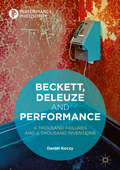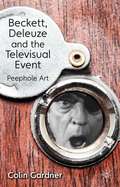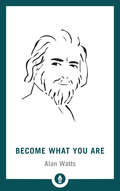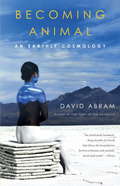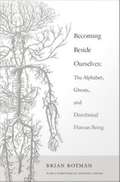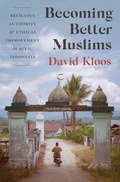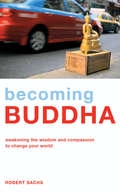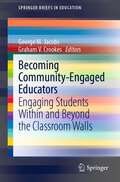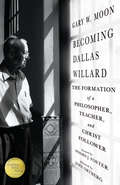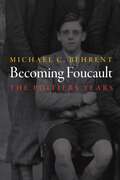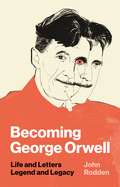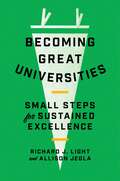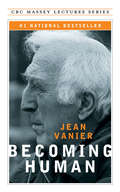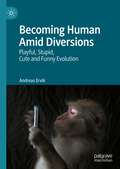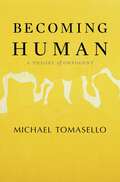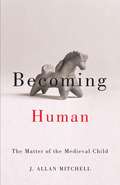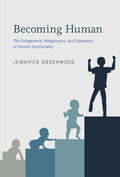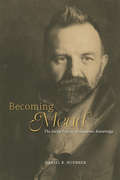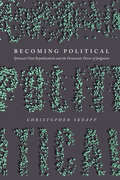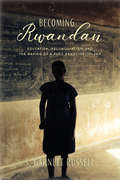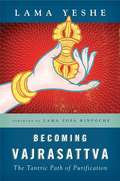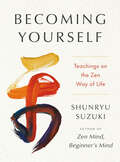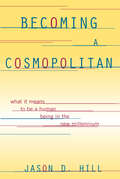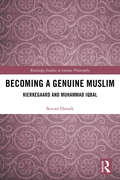- Table View
- List View
Beckett's Art of Mismaking
by Leland de la DurantayeLeland de la Durantaye helps us understand Beckett's strangeness and notorious difficulty by arguing that Beckett's lifelong campaign was to mismake on purpose--not to denigrate himself, or his audience, or reconnect with the child or savage within, but because he believed that such mismaking is in the interest of art and will shape its future.
Beckett, Deleuze and Performance: A Thousand Failures and A Thousand Inventions (Performance Philosophy)
by Daniel KoczyThis book draws on the theatrical thinking of Samuel Beckett and the philosophy of Gilles Deleuze to propose a method for research undertaken at the borders of performance and philosophy. Exploring how Beckett fabricates encounters with the impossible and the unthinkable in performance, it asks how philosophy can approach what cannot be thought while honouring and preserving its alterity. Employing its method, it creates a series of encounters between aspects of Beckett’s theatrical practice and a range of concepts drawn from Deleuze’s philosophy. Through the force of these encounters, a new range of concepts is invented. These provide novel ways of thinking affect and the body in performance; the possibility of theatrical automation; and the importance of failure and invention in our attempts to respond to performance encounters. Further, this book includes new approaches to Beckett’s later theatrical work and provides an overview of Deleuze’s conception of philosophical practice as an ongoing struggle to think with immanence.
Beckett, Deleuze and the Televisual Event
by Colin GardnerAn expressive dialogue between Deleuze's philosophical writings on cinema and Beckett's innovative film and television work, the book explores the relationship between the birth of the event - itself a simultaneous invention and erasure - and Beckett's attempts to create an incommensurable space within the interstices of language as a (W)hole.
Become What You Are: Expanded Edition
by Alan W. Watts"Life exists only at this very moment, and in this moment it is infinite and eternal. For the present moment is infinitely small; before we can measure it, it has gone, and yet it exists forever. . . . You may believe yourself out of harmony with life and its eternal Now; but you cannot be, for you are life and exist Now."--from Become What You Are In this collection of writings, including nine new chapters never before available in book form, Watts displays the intelligence, playfulness of thought, and simplicity of language that has made him so perennially popular as an interpreter of Eastern thought for Westerners. He draws on a variety of religious traditions, and covers topics such as the challenge of seeing one's life "just as it is," the Taoist approach to harmonious living, the limits of language in the face of ineffable spiritual truth, and the psychological symbolism of Christian thought.
Becoming Animal
by David AbramDavid Abram's first book, The Spell of the Sensuous--hailed as "revolutionary" by the Los Angeles Times, as "daring and truly original" by Science--has become a classic of environmental literature. Now Abram returns with a startling exploration of our human entanglement with the rest of nature. As the climate veers toward catastrophe, the innumerable losses cascading through the biosphere make vividly evident the need for a metamorphosis in our relation to the living land. For too long we've inured ourselves to the wild intelligence of our muscled flesh, taking our primary truths from technologies that hold the living world at a distance. This book subverts that distance, drawing readers ever deeper into their animal senses in order to explore, from within, the elemental kinship between the body and the breathing Earth. The shapeshifting of ravens, the erotic nature of gravity, the eloquence of thunder, the pleasures of being edible: all have their place in Abram's investigation. He shows that from the awakened perspective of the human animal, awareness (or mind) is not an exclusive possession of our species but a lucid quality of the biosphere itself--a quality in which we, along with the oaks and the spiders, steadily participate. With the audacity of its vision and the luminosity of its prose, Becoming Animal sets a new benchmark for the human appraisal of our place in the whole.From the Hardcover edition.
Becoming Beside Ourselves: The Alphabet, Ghosts, and Distributed Human Being
by Brian RotmanBecoming Beside Ourselves continues the investigation that the renowned cultural theorist and mathematician Brian Rotman began in his previous books Signifying Nothing and Ad Infinitum. . . The Ghost in Turing's Machine: exploring certain signs and the conceptual innovations and subjectivities that they facilitate or foreclose. In Becoming Beside Ourselves, Rotman turns his attention to alphabetic writing or the inscription of spoken language. Contending that all media configure what they mediate, he maintains that alphabetic writing has long served as the West's dominant cognitive technology. Its logic and limitations have shaped thought and affect from its inception until the present. Now its grip on Western consciousness is giving way to virtual technologies and networked media, which are reconfiguring human subjectivity just as alphabetic texts have done for millennia. Alphabetic texts do not convey the bodily gestures of human speech: the hesitations, silences, and changes of pitch that infuse spoken language with affect. Rotman suggests that by removing the body from communication, alphabetic texts enable belief in singular, disembodied, authoritative forms of being such as God and the psyche. He argues that while disembodied agencies are credible and real to "lettered selves," they are increasingly incompatible with selves and subjectivities formed in relation to new virtual technologies and networked media. Digital motion-capture technologies are restoring gesture and even touch to a prominent role in communication. Parallel computing is challenging the linear thought patterns and ideas of singularity facilitated by alphabetic language. Barriers between self and other are breaking down as the networked self is traversed by other selves to become multiple and distributed, formed through many actions and perceptions at once. The digital self is going plural, becoming beside itself.
Becoming Better Muslims: Religious Authority and Ethical Improvement in Aceh, Indonesia
by David KloosHow do ordinary Muslims deal with and influence the increasingly pervasive Islamic norms set by institutions of the state and religion? Becoming Better Muslims offers an innovative account of the dynamic interactions between individual Muslims, religious authorities, and the state in Aceh, Indonesia. Relying on extensive historical and ethnographic research, David Kloos offers a detailed analysis of religious life in Aceh and an investigation into today’s personal processes of ethical formation.Aceh is known for its history of rebellion and its recent implementation of Islamic law. Debunking the stereotypical image of the Acehnese as inherently pious or fanatical, Kloos shows how Acehnese Muslims reflect consciously on their faith and often frame their religious lives in terms of gradual ethical improvement. Revealing that most Muslims view their lives through the prism of uncertainty, doubt, and imperfection, he argues that these senses of failure contribute strongly to how individuals try to become better Muslims. He also demonstrates that while religious authorities have encroached on believers and local communities, constraining them in their beliefs and practices, the same process has enabled ordinary Muslims to reflect on moral choices and dilemmas, and to shape the ways religious norms are enforced.Arguing that Islamic norms are carried out through daily negotiations and contestations rather than blind conformity, Becoming Better Muslims examines how ordinary people develop and exercise their religious agency.
Becoming Buddha
by Robert SachsTo "Become Buddha" is to AWAKE. We need to awake to our personal responsibility-not only for our own lives but for the world around us. Individual efforts can change the world. This book does not promise enlightenment but it will provide a path-a path that, if you follow it, will transform your life. Buddhist masters say that we are in a "Dark Age". Terrorist attacks, wars, economic failures, and natural disasters have created an atmosphere of fear. Tibetan masters encourage us not to lose heart-catastrophes have happened before and we have overcome them. Robert Sachs shows how Tibetan Buddhist teachings can have a real influence on our personal lived and equally on contemporary politics. He presents the four thoughts that revolutionize the mind, and demonstrates how we must take personal responsibility for the future. The Four Noble Truths show us there is no need to despair; and the four components of action will change our attitude to life and give us practical instruction on how to act. Using the power of meditation to make a difference, we can turn the inherent goodness of the human race into positive energy to help transform the world. The Venerable Chogyam Trungpa Rinpoche used to say, "A mind that is transformed, free and cheerful can help create peace and happiness. Let us start down the path from this very moment."
Becoming Community-Engaged Educators: Engaging Students Within and Beyond the Classroom Walls (SpringerBriefs in Education)
by Graham V. Crookes George M. JacobsThis book puts forth a call to engagement for educators at all levels of education and in all subject areas, with a focus on language education. Through using a grounded theory approach, it features semi-structured interviews, in a qualitative approach, with educators who embody community engaged education. Each chapter encompasses a case study that examines the interviewee's motivations, strategies, successes and failures. This book presents a local theory of community-engaged teachers and researchers to assist educators in developing as a community-engaged teacher or researcher. It asks and attempts to answer critical questions concerning the initial induction into community engagement, the maintenance of energy, commitment, and motivation, and the role of support networks. Through these, this book examines what is needed to sustain such an identity, and support campaigns of action or individual engagement over both the short and long term.
Becoming Dallas Willard: The Formation of a Philosopher, Teacher, and Christ Follower
by Richard J. Foster Gary MoonDallas Willard was a personal mentor and inspiration to hundreds of pastors, philosophers, and average churchgoers. His presence and ideas rippled through the lives of many prominent leaders and authors, such as John Ortberg, Richard Foster, James Bryan Smith, Paula Huston, and J. P. Moreland. As a result of these relationships and the books he wrote, he fundamentally altered the way tens of thousands of Christians have understood and experienced the spiritual life. Whether great or small, everyone who met Dallas was impressed by his personal attention, his calm confidence, his wisdom, and his profound sense of the spiritual. But he was not always the man who lived on a different plane of reality than so many of the rest of us. He was someone who had to learn to be a husband, a parent, a teacher, a Christ follower. The journey was not an easy one. He absorbed some of the harshest and most unfair blows life can land. His mother died when he was two, and after his father remarried he was exiled from his stepmother’s home. Growing up in Depression-era, rural Missouri and educated in a one-room schoolhouse, he knew poverty, deprivation, anxiety, self-doubt, and depression. Though the pews he sat in during his early years were not offering much by way of love and mercy, Dallas, instead of turning away, kept looking for the company of a living, present, and personal God. In Gary W. Moon’s candid and inspiring biography, we read how Willard became the person who mentored and partnered with his young pastor, Richard Foster, to inspire some of the most influential books on spirituality of the last generation. We see how his love of learning took him on to Baylor, the University of Wisconsin, and the University of Southern California, where he became a beloved professor and one of the most versatile members of the philosophy department. The life of Dallas Willard deserves attention because he became a person who himself experienced authentic transformation of life and character. Dallas Willard not only taught about spiritual disciplines, he became a different person because of them. He became a grounded person, a spiritually alive person as he put them into practice, finding God, as he often said, "at the end of his rope." Here is a life that gives us all hope.
Becoming Foucault: The Poitiers Years (Intellectual History of the Modern Age)
by Michael C. BehrentThough Michel Foucault is one of the most important thinkers of the twentieth century, little is known about his early life. Even Foucault’s biographers have neglected this period, preferring instead to start the story when the future philosopher arrives in Paris.Becoming Foucault is a historical reconstruction of the world in which Foucault grew up: the small city of Poitiers, France, from the 1920s until the end of the Second World War. Beyond exploring previously unexamined aspects of Foucault’s childhood, including his wartime ordeals, it proposes an original interpretation of Foucault’s oeuvre. Michael Behrent argues that Foucault, in addition to being a theorist of power, knowledge, and selfhood, was also a philosopher of experience. He was a thinker intent on making sense of the events that he lived through. Behrent identifies four specific experiences in Foucault’s childhood that exercised a decisive influence on him and that, in various ways, he later made the subject of his philosophy: his family’s deep connections to the medical profession; his upbringing in a bourgeois household; the German Occupation during World War II; and his Catholic education.Behrent not only reconstructs the specific nature of these experiences but also shows how reference to them surfaces in Foucault’s later work. In this way, the book both sheds light on a formative period in the philosopher’s life and offers a unique interpretation of key aspects of his thought.
Becoming George Orwell: Life and Letters, Legend and Legacy
by John RoddenThe remarkable transformation of Orwell from journeyman writer to towering iconIs George Orwell the most influential writer who ever lived? Yes, according to John Rodden’s provocative book about the transformation of a man into a myth. Rodden does not argue that Orwell was the most distinguished man of letters of the last century, nor even the leading novelist of his generation, let alone the greatest imaginative writer of English prose fiction. Yet his influence since his death at midcentury is incomparable. No other writer has aroused so much controversy or contributed so many incessantly quoted words and phrases to our cultural lexicon, from “Big Brother” and “doublethink” to “thoughtcrime” and “Newspeak.” Becoming George Orwell is a pathbreaking tour de force that charts the astonishing passage of a litterateur into a legend.Rodden presents the author of Animal Farm and Nineteen Eighty-Four in a new light, exploring how the man and writer Orwell, born Eric Arthur Blair, came to be overshadowed by the spectral figure associated with nightmare visions of our possible futures. Rodden opens with a discussion of the life and letters, chronicling Orwell’s eccentricities and emotional struggles, followed by an assessment of his chief literary achievements. The second half of the book examines the legend and legacy of Orwell, whom Rodden calls “England’s Prose Laureate,” looking at everything from cyberwarfare to “fake news.” The closing chapters address both Orwell’s enduring relevance to burning contemporary issues and the multiple ironies of his popular reputation, showing how he and his work have become confused with the very dreads and diseases that he fought against throughout his life.
Becoming Great Universities: Small Steps for Sustained Excellence
by Richard J. Light Allison JeglaHow campus communities of every kind can transform themselves from good to greatBecoming Great Universities highlights ten core challenges that all colleges and universities face and offers practical steps that everyone on campus—from presidents to first-year undergraduates—can take to enhance student life and learning.This incisive book, written in a friendly and engaging style, draws on conversations with presidents, deans, and staff at hundreds of campuses across the country as well as scores of in-depth interviews with students and faculty. Providing suggestions that all members of a campus community can implement, Richard Light and Allison Jegla cover topics such as how to build a culture of innovation on campus, how to improve learning outcomes through experimentation, how to help students from under-resourced high schools succeed in college, and how to attract students from rural areas who may not be considering colleges far from their communities. They offer concrete ways to facilitate constructive interactions among students from different backgrounds, create opportunities for lifelong learning and engagement, and inspire students to think globally. And most of the ideas presented in this book can be implemented at little to no cost.Featuring a wealth of evidence-based examples, Becoming Great Universities offers actionable suggestions for everyone to have a positive impact on college life regardless of whether their campus is urban or rural, private or public, large or small, wealthy or not.
Becoming Human (The CBC Massey Lectures)
by Jean VanierAcclaimed as a man "who inspires the world" (Maclean's) and a "nation builder" (Globe and Mail), Jean Vanier has made a difference in the lives of countless people -- including those with disabilities and the many young people who have been moved by his life's work. Becoming Human is a modern classic that continues to resonate among the generations. In a world of competition, where the strong dominate the weak, Vanier calls on each one of us to open ourselves to those we perceive as different or inferior. This, he says, is the key to true personal and societal freedom. This 10th anniversary edition includes a new introduction by the author.
Becoming Human Amid Diversions: Playful, Stupid, Cute and Funny Evolution.
by Andreas ErvikThis book develops a philosophy of the predominant yet obtrusive aspects of digital culture, arguing that what seems like insignificant distractions of digital technology - such as video games, mindless browsing, cute animal imagery, political memes, and trolling - are actually keyed into fundamental aspects of evolution. These elements are commonly framed as distractions in an economy of attention and this book approaches them with the prospect of understanding their attraction, from the starting point of diversions. Diversions designate not simply shifting states of attention but characterize the direction of any system on a different course, a theoretical perspective which makes it possible to investigate distractions as not only by-products of contemporary media and human attention. The perspective shifts from distractions as the unwanted and inconsequential to considering instead the function of diversions in the process of evolutionary development. Grounded in media theory but drawing from diverse interdisciplinary perspectives in biology, philosophy, and systems theory, this book provocatively theorizes the process of diversions – of the playful, stupid, cute, and funny – as significant for the evolution of a range of organisms.
Becoming Human: A Theory of Ontogeny
by Michael TomaselloVirtually all theories of how humans have become a distinctive species focus on evolution. Here, Michael Tomasello proposes a complementary theory focused on ontogenetic processes. Built on the essential ideas of Vygotsky, his data-driven model explains how those things that make us most human are constructed during the first six years of life.
Becoming Human: The Matter of the Medieval Child
by J. Allan MitchellBecoming Human argues that human identity was articulated and extended across a wide range of textual, visual, and artifactual assemblages from the twelfth to the fifteenth centuries. J. Allan Mitchell shows how the formation of the child expresses a manifold and mutable style of being. To be human is to learn to dwell among a welter of things. A searching and provocative historical inquiry into human becoming, the book presents a set of idiosyncratic essays on embryology and infancy, play and games, and manners, meals, and other messes. While it makes significant contributions to medieval scholarship on the body, family, and material culture, Becoming Human theorizes anew what might be called a medieval ecological imaginary. Mitchell examines a broad array of phenomenal objects—including medical diagrams, toy knights, tableware, conduct texts, dream visions, and scientific instruments—and in the process reanimates distinctly medieval ontologies. In addressing the emergence of the human in the later Middle Ages, Mitchell identifies areas where humanity remains at risk. In illuminating the past, he shines fresh light on our present.
Becoming Human: The Ontogenesis, Metaphysics, and Expression of Human Emotionality (Life and Mind: Philosophical Issues in Biology and Psychology)
by Jennifer GreenwoodA novel, wide-ranging, and comprehensive account of how human emotionality develops, proposing a process in which “nature” and “nurture” are integrated. In Becoming Human, Jennifer Greenwood proposes a novel theory of the development of human emotionality. In doing so, she makes important contributions to the nature-nurture debate in emotion theory and the intracranialist–transcranialist debate in philosophy of mind. Greenwood shows that the distinction between nature and nurture is unfounded; biological and cultural resources are deeply functionally integrated throughout the developmental process. She also shows that human emotional and language development are transcranialist achievements; human ontogenesis takes place in extended cognitive systems that include environmental, technological, and sociocultural resources. Greenwood tells the story of how each of us becomes a full human being: how human brains are constructed and how these brains acquire their contents through massive epigenetic scaffolding. After an introduction in which she explains the efficiency of the human newborn as a learning machine, Greenwood reviews traditional and contemporary theories of emotion, highlighting both strengths and limitations. She addresses the intracranialist–transcranialist debate, arguing that transcranialists have failed to answer important intracranialist objections; describes the depth of the functional integration of intraneural and external resources in emotional ontogenesis; examines early behavior patterns that provide the basis for the development of language; explains the biosemantic theory of representational content, and the wider cognitive systems that define it; and argues that language production and comprehension are always context dependent. Finally, in light of the deep and complex functional integration of neural, corporeal, and sociocultural resources in human ontogenesis, she recommends a multidisciplinary, collaborative approach for future research.
Becoming Mead: The Social Process of Academic Knowledge
by Daniel R. HuebnerGeorge Herbert Mead is a foundational figure in sociology, best known for his book "Mind, Self, and Society," which was put together after his death from course notes taken by stenographers and students and from unpublished manuscripts. Mead, however, never taught a course primarily housed in a sociology department, and he wrote about a wide variety of topics far outside of the concerns for which he is predominantly rememberedOCoincluding experimental and comparative psychology, the history of science, and relativity theory. a In short, he is known in a discipline in which he did not teach for a book he did not write. In" Becoming Mead," Daniel R. Huebner traces the ways in which knowledge has been produced by and about the famed American philosopher. Instead of treating MeadOCOs problematic reputation as a separate topic of study from his intellectual biography, Huebner considers both biography and reputation as social processes of knowledge production. He uses Mead as a case study and provides fresh new answers to critical questions in the social sciences, such as how authors come to be considered canonical in particular disciplines, how academics understand and use othersOCO works in their research, and how claims to authority and knowledge are made in scholarship. "Becoming Mead" provides a novel take on the history of sociology, placing it in critical dialogue with cultural sociology and the sociology of knowledge and intellectuals. "
Becoming Political: Spinoza’s Vital Republicanism and the Democratic Power of Judgment
by Christopher SkeaffIn this pathbreaking work, Christopher Skeaff argues that a profoundly democratic conception of judgment is at the heart of Spinoza’s thought. Bridging Continental and Anglo-American scholarship, critical theory, and Spinoza studies, Becoming Political offers a historically sensitive, meticulous, and creative interpretation of Spinoza’s texts that reveals judgment as the communal element by which people generate power to resist domination and reconfigure the terms of their political association. If, for Spinoza, judging is the activity which makes a people powerful, it is because it enables them to contest the project of ruling and demonstrate the political possibility of being equally free to articulate the terms of their association. This proposition differs from a predominant contemporary line of argument that treats the people’s judgment as a vehicle of sovereignty—a means of defining and refining the common will. By recuperating in Spinoza’s thought a “vital republicanism,” Skeaff illuminates a line of political thinking that decouples democracy from the majoritarian aspiration to rule and aligns it instead with the project of becoming free and equal judges of common affairs. As such, this decoupling raises questions that ordinarily go unasked: what calls for political judgment, and who is to judge? In Spinoza’s vital republicanism, the political potential of life and law finds an affirmative relationship that signals the way toward a new constitutionalism and jurisprudence of the common.
Becoming Rwandan: Education, Reconciliation, and the Making of a Post-Genocide Citizen (Genocide, Political Violence, Human Righ)
by S. Garnett RussellIn the aftermath of the genocide, the Rwandan government has attempted to use the education system in order to sustain peace and shape a new generation of Rwandans. Their hope is to create a generation focused on a unified and patriotic future rather than the ethnically divisive past. Yet, the government’s efforts to manipulate global models around citizenship, human rights, and reconciliation to serve its national goals have had mixed results, with new tensions emerging across social groups. Becoming Rwandan argues that although the Rwandan government utilizes global discourses in national policy documents, the way in which teachers and students engage with these global models distorts the intention of the government, resulting in unintended consequences and undermining a sustainable peace.
Becoming Vajrasattva
by Nicholas Ribush Lama Thubten Zopa Rinpoche Lama Thubten Yeshe"The practice of purification is one of the most important solutions to life's problems." - Lama Zopa Rinpoche Common to all four traditions of Tibetan Buddhism, the practice of Vajrasattva is used to purify negative karma, illness, and obstacles to spiritual development. Lama Yeshe, the inspirational teacher who strongly influenced the development of Buddhism in the West, found that the practice of Vajrasattva brought dramatic results for his Western students. Becoming Vajrasattva is a complete guide to this purification practice, providing instruction on the method, commentary on the traditional texts, and insight into tantra. Also included is an entire section of complete retreat instructions - indispensable reading material for anyone undertaking a retreat in the Tibetan tradition.
Becoming Yourself: Teachings on the Zen Way of Life
by Shunryu SuzukiFrom the beloved author of Zen Mind, Beginner&’s Mind comes a new book of teachings on the essence of Zen practice"I felt a burden being lifted from my shoulders just by reading this remarkable book." —Oliver Burkeman&“Our way of sitting is for you to become yourself.&”In this long-awaited book from one of the most influential spiritual teachers of the last century, Shunryu Suzuki Roshi shares simple, warmhearted teachings on a practice that is fundamentally about becoming yourself. In his inimitable style, filled with humor and insight, Becoming Yourself speaks directly to the newest beginners while also serving as a touchstone and a continual source of inspiration for even the most experienced practitioners and Zen teachers.Becoming Yourself unearths new jewels from the late Suzuki&’s lectures and brings to light many of his unpublished teachings.Becoming yourself is not meant to be understood as an idea; it is meant to be tried out as a way of being. It is &“Just to sit,&” a practice of wholeheartedly being as you are, moment after moment, no matter what is happening. It is a practice of deeply connecting with how it feels to be alive in your surroundings, whether on a meditation cushion or not, and stepping forward from that connection. It is opening to your life, wherever you are, and finding right there a deep well of innate wisdom, compassion and care.
Becoming a Cosmopolitan: What It Means to Be a Human Being in the New Millennium
by Jason D HillThe philosopher and author of Beyond Blood Identities offers a new paradigm of persona freedom and moral self-possession. As a Jamaican immigrant arriving in the United States at the age of twenty, Jason Hill noticed how often Americans identified themselves in terms of race and ethnicity. He observed, for example, the reluctance of West Indians to joins 'black causes' for fear of losing their identity. He began to ask himself what sort of world he wanted to live in, a quest that in time led him to the idea of the cosmopolitan. In Becoming a Cosmopolitan, Jason D. Hill argues that we need a new understanding of the self. He revives the idea of the cosmopolitan, the person who identifies the world as home. Arguing for the right to forget where we came from, Hill proposes a new moral cosmopolitanism for the new millennium.
Becoming a Genuine Muslim: Kierkegaard and Muhammad Iqbal (Routledge Studies in Islamic Philosophy)
by Sevcan OzturkDespite the apparent lack of any cultural and religious connection between Kierkegaard and Iqbal, their philosophical and religious concerns and their methods of dealing with these concerns show certain parallels. This book provides a Kierkegaardian reading of Muhammad Iqbal’s idea of becoming a genuine Muslim. It reflects on the parallels between the philosophical approaches of Kierkegaard and Iqbal, and argues that, though there are certain parallels between their approaches, there is a significant difference between their philosophical stances. Kierkegaard was concerned with developing an existential dialectics; Iqbal, however, focused mostly on the identification of the problems of the modern Muslim world. As a result, Iqbal’s idea of becoming a genuine Muslim – the practical aspect of his thought and one of the most central issues of his philosophy – seems to be unclear and even contradictory at points. This book therefore uses the parallels between the two philosophers' endeavours and the notions developed by Kierkegaard to provide a strong hermeneutical tool for clarifying where the significance of Iqbal’s idea of becoming a Muslim lies. By bringing together two philosophers from different cultural, traditional and religious backgrounds, this book will appeal to students and scholars of Comparative Politics, Contemporary Islamic Philosophy and the Philosophy of Religion.

